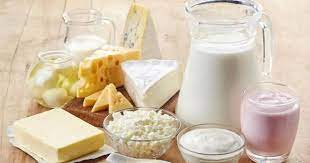Today, June 1, is World Milk Day, and for this reason, we will talk about dairy products. Depending on who we talk to on the subject, we receive very different information; there are those who say that dairy products are very healthy and recommendable and there are those who consider it essential to eliminate them completely from our diet. It is normal that doubts arise, especially lately, when there are so many campaigns against them, but are dairy products really so unadvisable?
As can happen with many other foods, everything depends on our customs or culture and, above all, on the effect it causes in our organism. I mean, a person allergic to casein -the milk protein- cannot eat or drink dairy products because his body will create an allergic response to this food. On the other hand, those who tolerate and like them, may introduce them in every meal of the day in its different versions: milk, yogurt, cheese, curd, etc..
BUT IS IT A GOOD FOOD OR NOT?
To begin with, I would like to clarify that milk is a nutritionally complete food. This means that it provides us with macronutrients: proteins, fats and simple carbohydrates and a good variety of micronutrients: vitamins such as A, D, E, B2 and B12 and minerals such as calcium, potassium and phosphorus. In general terms, its derivatives also contain these same nutrients, although in different proportions, generally more concentrated because they lose part of their water content.
“Milk is a nutritionally complete food that provides us with macronutrients. Its derivatives also contain these nutrients but in other proportions.”
THEY SEEM TO BE QUITE HEALTHY. SO WHY SUCH A BAD REPUTATION?
There are many negative comments about dairy, especially milk. Here we will analyze some of them:
- We are the only adult mammal that drinks milk 2.
We are the only mammal that does a lot of things, and that doesn’t mean we are hesitant about other aspects of our lives, such as flying or writing a book. So why do it with milk? It is true that part of the population, especially in Asia, does not tolerate dairy. In Europe, however, the percentage of lactose intolerant people is not so high. What is true is that our body can stop producing lactase, the enzyme that digests milk sugar, if we totally eliminate lactose from our diet. It is also true that the ability to produce lactase can be lost over the years, but we would be talking about the elderly population and this does not always happen.
- If I am lactose intolerant, should I eliminate dairy products from my diet?
Each person must assess his or her tolerance, as there are people who cannot drink a glass of milk but who are fine with yogurt or a little cheese. This is because the bacteria that have transformed milk into these derivatives have acted on the lactose making them more digestible.
- Skimmed milk is better than whole milk.
This point, as has happened with other foods in recent years – for example, with eggs and cholesterol – is changing and it is beginning to be seen that the type of saturated fats contained in dairy products does not have such a clear influence on the increase in cholesterol. They can also have a protective role against weight gain because they satiate a little more, but always within a framework of a varied and balanced diet, with a high intake of vegetables and fruits, whole-grain products, legumes, etc.
- Milk causes excess mucus
I am not going to expand on this point: scientific studies have shown that this direct relationship does not exist. So, we can affirm that milk does NOT cause excess mucus.
In conclusion, if there is no lactose intolerance or casein allergy and, of course, we like them, we can consume dairy products. It is also important to know that this food group is one of the best sources of calcium we have and that by eating 2 or 3 servings a day*, we can cover the dose of calcium we need per day.
*In the case of children, pregnant or lactating women and elderly people, it is advisable to increase to 3-4 servings a day.













